theartsdesk Q&A: bass-baritone Christopher Purves on communicating everything from Handel to George Benjamin | reviews, news & interviews
theartsdesk Q&A: bass-baritone Christopher Purves on communicating everything from Handel to George Benjamin
theartsdesk Q&A: bass-baritone Christopher Purves on communicating everything from Handel to George Benjamin
The great singing actor on his best experiences - including Zurich Opera's new Ring
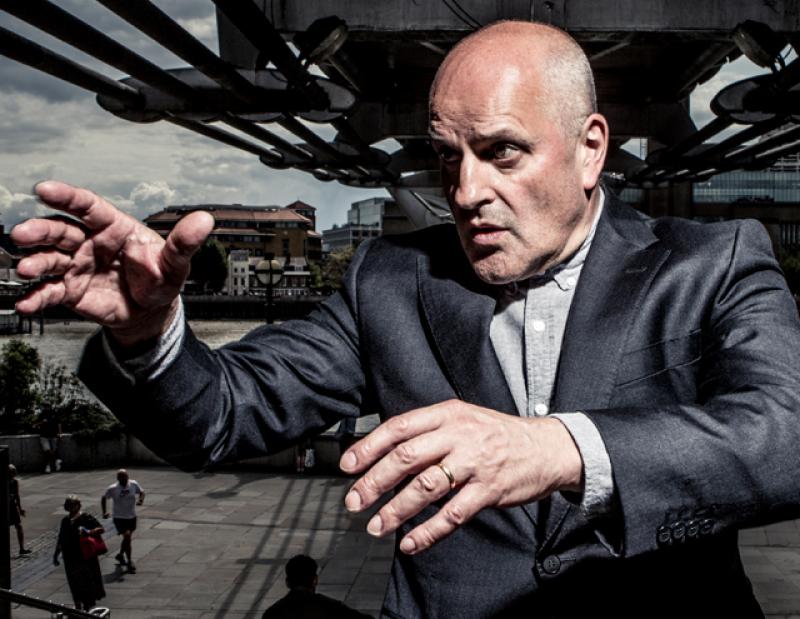
He’s the most haunting, at times terrifying Wozzeck I’ve seen, in Richard Jones's Welsh National Opera baked-bean-factory production, and the funniest Falstaff. When we met in his dressing room at the Zurich Opera House, Christopher Purves was about to perform the central role of bitter and twisted Alberich in Wagner’s Das Rheingold, and in a week’s time you can hear him singing Handel again, another speciality at the other end of the spectrum.
I guess it also has to be mentioned, if only once here, that he went on from life as a choral scholar at King’s College Cambridge to being a member of jazz vocal harmony group Harvey and the Wallbangers. But then opera, oratorio and Lieder claimed all his considerable energies.
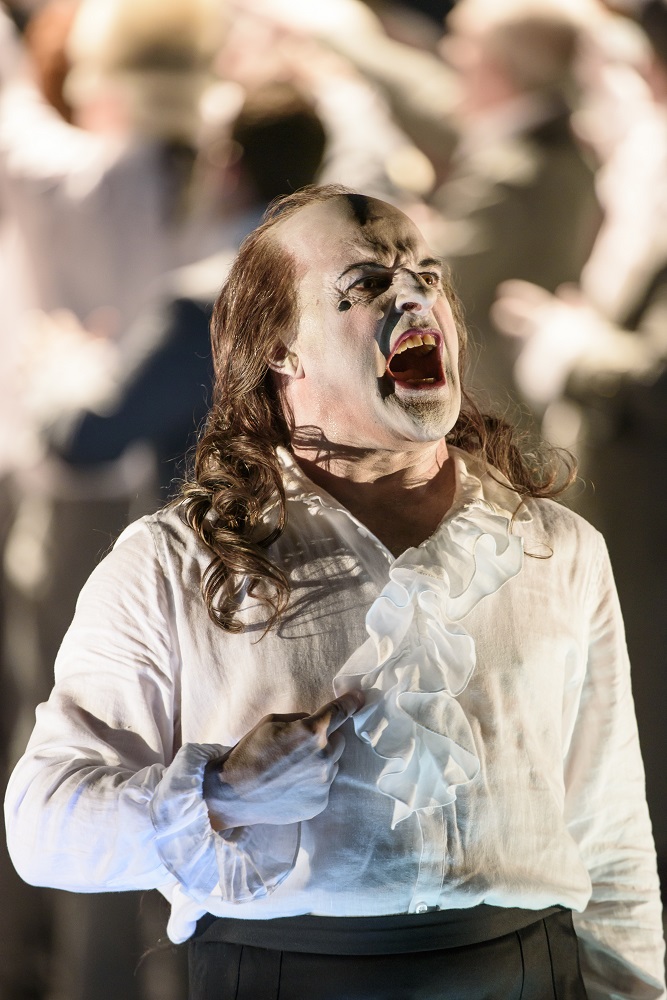 Purves is a stage animal, which as he later explains here is why he was so in tune with Barrie Kosky for the amazing Glyndebourne production of Handel's Saul (pictured left by Bill Cooper in the title role in 2015), already a 21st century classic, and why he also chimes well with the kinetic energy of Zurich intendant and director Andreas Homoki. Before I even switch on the microphone, as we walk down a corridor with costumes in a rack which holds not only his furry black Alberich coat (pictured below in action below with Wolfgang Ablinger-Sperrhacke as Mime by Monika Ritterhaus) but also swastikas on jackets – for Robert Carsen’s 1930s-set Strauss Arabella – he’s telling me exuberantly about how happy he is to be here in a place where the people are a joy to work with and everything runs like clockwork.
Purves is a stage animal, which as he later explains here is why he was so in tune with Barrie Kosky for the amazing Glyndebourne production of Handel's Saul (pictured left by Bill Cooper in the title role in 2015), already a 21st century classic, and why he also chimes well with the kinetic energy of Zurich intendant and director Andreas Homoki. Before I even switch on the microphone, as we walk down a corridor with costumes in a rack which holds not only his furry black Alberich coat (pictured below in action below with Wolfgang Ablinger-Sperrhacke as Mime by Monika Ritterhaus) but also swastikas on jackets – for Robert Carsen’s 1930s-set Strauss Arabella – he’s telling me exuberantly about how happy he is to be here in a place where the people are a joy to work with and everything runs like clockwork.
CHRISTOPHER PURVES I’m overjoyed to be here, because I actually think this house is not only deadly serious about this opera, and I don’t mean po-faced serious, but everything they do seems to have a really good thought about it, it’s not just chucked together, and I’m not necessarily saying that happens in other houses. But you do have a feeling that there’s a greater brain at work. And I think it’s one of the nicest places, if not THE nicest, to work.
DAVID NICE And it’s a nice civilised size.
It’s fantastic. We’re not having to yell – I guess the only problem we have as singers is that it’s a very open pit, which means that the sound of the orchestra is very, very present. I was talking to one of the accompanists about Saturday’s performance, and she said the balance was absolutely fantastic and the orchestra was very respectful of the tessitura of each performer. 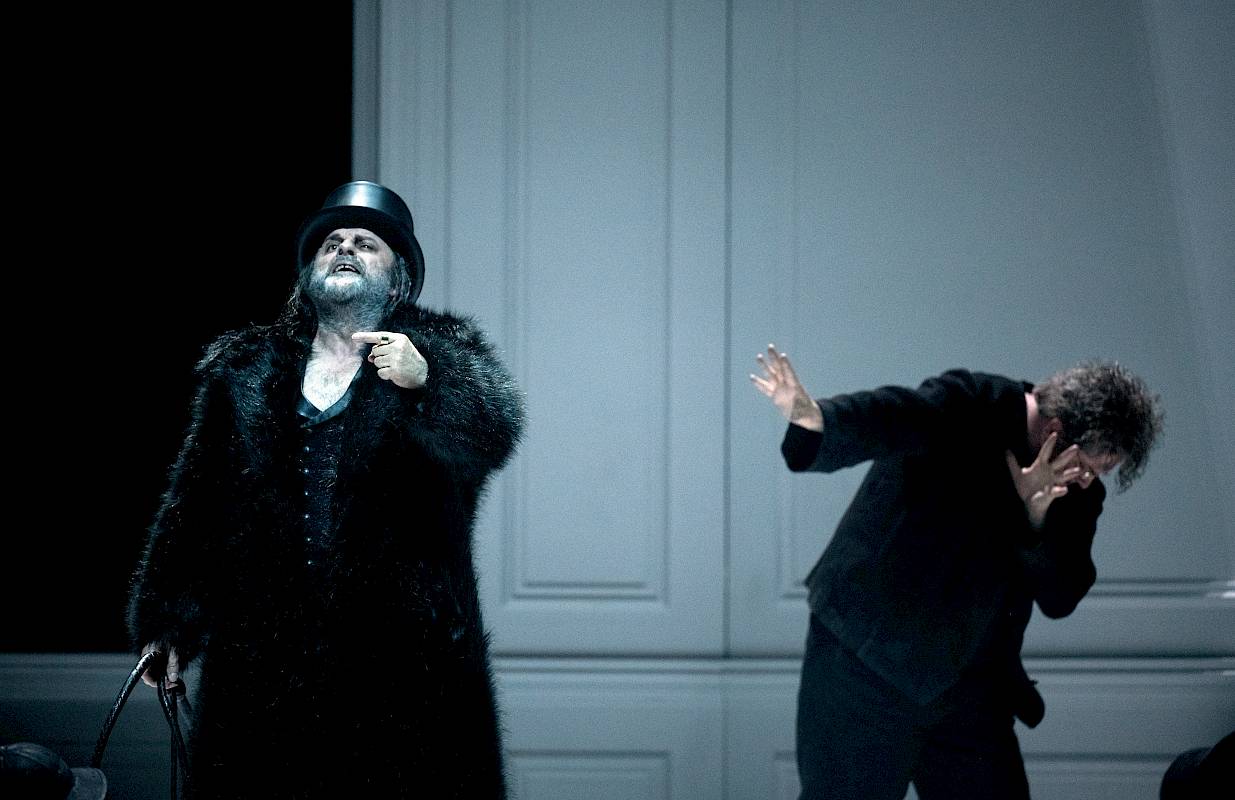 Noseda gets a great transparency, doesn’t he?
Noseda gets a great transparency, doesn’t he?
Absolutely. I’ve never had the pleasure of working with Gianandrea before, so I don’t know how to judge him with this orchestra against another one, but as a conductor of course he’s extremely accomplished, but even better than that is, again, he’s very respectful. One of the first things he said was, look, you probably all know this so much better than me, this is my first Ring cycle, and I’m learning, it will take me a bit of time, but I’ll get there. When someone makes a bold statement like that, I think actually it helps us all, because we’re not thinking, oh, he knows so much better, you can actually say, I wonder if we could move it on just a wee bit more – I don’t know.
It's your role debut as well, isn’t it [I’d been told so]?
It isn’t, actually. In a way it is, and I’ll explain why. I did this about eight years ago in Houston, but my head was in a very strange place at that time, and I was having, as I think probably an awful lot of performers have, a lot of questioning, what the hell am I doing this for, should I really be doing this, when is the knock going to come on the dressing room door and I’ll be found out. All those thoughts were going through my head. I was going through a period of really not being able to remember certain things, and that I think was a psychological wake-up call. I needed to get some help to clear away the debris that was cluttering up my performing. So in a way I did do it, but I don’t remember very much about it. So in many respects I do class this as a debut even though, strictly speaking, it isn’t.
And then did you just sing the Rheingold Alberich, or Alberich in the others as well?
I was supposed to sing in Siegfried, but I actually sang it in Toronto. And just after that – it sound like I’m a clapped out old warhorse – I had a vocal problem that I couldn’t identify at all, and I suppose it was that I had always been able to sing whatever I wanted, I could go from the most ridiculous bass notes to the more ridiculous tenor notes, and everything in between – good coloratura; this is going back a few years now. I suppose I was still trying to use the same kind of vocal technique that had seen me through that period, with something a bit larger, like the Siegfried Alberich, for instance, which is a bit of a heftier role than the Rheingold Alberich, and I think my voice was saying, enough, look, if you’re going to take yourself seriously, in this repertoire you’re going to have to work out how to do it properly. So I went to a different teacher and we worked purely on technique, and it didn’t make a huge amount of an impact until recently. And I started to go back over the tapes I made, and it was, oh, I see, you know, one of those little lightbulb moments. It all started to make sense. So now I’ve adopted that. But weirdly enough I’m still being asked to do Handel, some of the stuff that I used to do years before, well perhaps not so many years, and of course I’m finding that a bit more difficult.
But you still perform regularly in oratorio? (Below – with trumpeter David Blackadder and the Academy of Ancient Music in 'The Trumpet Shall Sound' from Handel's Messiah)
I do, and I’ve got quite a few coming up after this, so I’m getting a bit worried if I’m going to be able to go allegro up the scale, it’s a bit of a minefield. But I enjoy it, and I enjoy the challenge, and I love the music, who doesn’t love a bit of Handel…
It’s probably tonic for the voice, too, isn’t it? But maybe not so much when you’re zipping between roles?
I think you’re right – everyone says, oh, always go back to Mozart, always go back to Handel: easier said than done sometimes. I think that’s the mantra of the older singer, who says [puts on plush voice], well, you know, in my day… But actually I think it’s more a question of not getting set in my ways. I don’t just want to do the sort of thing I’m doing now, Wagner Rings all the time, though I’m enjoying this enormously. I cannot remember the last time I was quite so happy in a role, really. I think it was probably something like Saul [in Barrie Kosky’s production] at Glyndebourne. (Below: although Purves doesn't sing here– it's a chorus – the acting gives you some idea of the extraordinary performance)
Well, that was kind of definitive.
It was heaven for me – because I think there was a true meeting of minds, myself and Barrie – he came off his pedestal, of course, and I had to reach up for the stars.
But he’s a very nice man, isn’t he?
Oh, he’s gorgeous, and I think the way we both approach opera is very similar, in that it’s done with gusto. I can’t stand still on stage unless I have to, unless the role demands it. I find myself constantly wanting to invent, and give something more – not just leave it to how it was in the rehearsal room. I’m in my 60s now, for God’s sake, and I’m still running around like a 25 year old.
But you’re lucky in the sense that the bass side of it only gets better with age I mean, there was that Russian, Mark Reizen, who sang Prince Gremin at the age of 90.
Seriously? But I bet you someone like Gwynne Howell could…I haven’t seen Gwynne for some time, but he was always a favourite of mine both as a singer and personally, there’s such a nobility in that voice, his whole demeanour is so beautiful, he’s such a lovely man. Ten years ago, maybe more, we did Billy Budd together in Amsterdam.
He wasn’t singing Claggart?
No, Dansker. Claggart was Clive Bayley.
And he’s just getting better and better,
Yes – I mean, I hope he’s not underrated, but I think he’s one of those real greats, because there’s an evenness in his voice that’s nowhere near him as a character, but his Claggart is really scary. Well, you remember him in Wozzeck. Because I thought his Doctor and Peter Hoare’s Hauptmann, and did you see Gun Britt Barkmin? Absolutely fantastic cast, I thought, everyone was on really top form. But Clive was the most evil, sinister Doctor.
It was when he sang Rimsky-Korsakov’s Ivan the Terrible at Grange Park Opera that I realized he was absolutely top notch.
And he was the Swallow in the Grimes we did in Spain, the Deborah Warner production, just before that Ivan the Terrible.
I have to tell you this, that Richard Jones sometimes comes along to the opera classes I give, and I didn’t say it at the time, but we were talking about Allan Clayton, who sang the role so beautifully, but partly because of the way Deborah Warner softened Grimes, I didn’t feel it was blistering in the way that Langridge was. And Richard said, ah, but did you see the Frankenstein, that amazing Gruber piece, and I said, yes, that was just sensational. And I asked him, who do you think of among the great singing actors? And he came straight out with, Alice Coote, and I wished I’d thought of you, because honestly, when I saw your Wozzeck and your Falstaff, I’m sure he would have agreed with me.
Well, that’s very kind of you.
He’s amazing to work with, isn’t he?
The first thing I did with him was Wozzeck, and I remember seeing his Hansel and Gretel at WNO, and I’m going back something like 2001, and I think it was the second time they’d put it on, and I looked at it with tears in my eyes and thought, I’ve got to work with the guy who did this. That is just genius.
At his best, he’s a visionary.
Totally. And what’s interesting about him is that he’s very, very demanding. It’s not an easy gig at all.
Every move is choreographed...
Absolutely, and he can judge what will look great in the opera house.
And brings people forward a lot more than other directors do.
Yes, and his troupe, as it were, of costume and set designers, and so on, they think about what it’s like to be a singer. Take Wozzeck, there’s a big wall, and all the sound just goes out. It’s a wonderful experience working with him, it can be very frustrating because he’s so exacting. But he will pretty much always elicit – I was going to say a wonderful performance, if it is wonderful, that’s great, but he gets the best out of you, and he just wants you to do as well as you possibly can. I’ve been in productions where I’ve thought, I just haven’t hit the mark at all, and Richard will come and say, you’ve got no idea, have you? Because you don’t know what you look like out front. No-one’s got a clue. You don’t know what you sound like. And that’s the interesting thing about performing as far as I’m concerned, in that somehow you’ve got to take your own ego out of the equation. Obviously it’s in there right at the beginning, but after a while you just have to say, OK, it’s not about sounding beautiful – if you do sound beautiful, well done – it’s about the art of communication.
That’s what it means to be a singing actor. 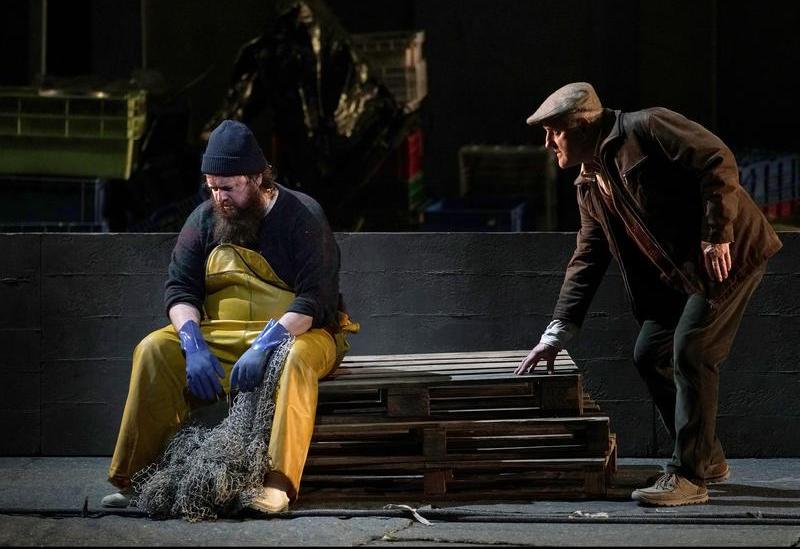 I think it’s maybe a little bit unfair on Allan [pictured above by Javier del Real with Purves in the Teatro Real Madrid production], because I think what he did with Grimes was one of the great lessons of how to perform in opera, because you hardly knew he was singing. He was communicating the text as well as he possibly could. OK, I take your point about softening the violence, and I didn’t agree with that. I remember there were quite a few rehearsals where I was standing peripherally, as Balstrode so often does, and there was that wonderful scene where the crowd turns on Ellen Orford, and you’re supposed to see and hear people spitting blood, going red in the face, really angry, in a way that perhaps only a mob, a football crowd, and I was standing on the side with Ellen, and I said to her, we could just walk off now, and no-one’s going to stop us. So the rehearsal broke down, and I said, look, would you allow me, just come with me, whatever I do, just go with it, because I want to make a point, and we just walked off stage in the rehearsal room. What’s going on, they shouted, what’s going on? Well, I said, we’re not under any pressure to remain here. Someone surely should be blocking our exit, otherwise we’ll go, oh I think things are getting a little bit nasty here, we’ll just nip off, bye. And I couldn’t understand for the life of me why there wasn’t more violence. Of course you should always, and I do, respect the director – it’s not my show, I don’t come with preconceived ideas of, I will do it exactly like this. Some people do.
I think it’s maybe a little bit unfair on Allan [pictured above by Javier del Real with Purves in the Teatro Real Madrid production], because I think what he did with Grimes was one of the great lessons of how to perform in opera, because you hardly knew he was singing. He was communicating the text as well as he possibly could. OK, I take your point about softening the violence, and I didn’t agree with that. I remember there were quite a few rehearsals where I was standing peripherally, as Balstrode so often does, and there was that wonderful scene where the crowd turns on Ellen Orford, and you’re supposed to see and hear people spitting blood, going red in the face, really angry, in a way that perhaps only a mob, a football crowd, and I was standing on the side with Ellen, and I said to her, we could just walk off now, and no-one’s going to stop us. So the rehearsal broke down, and I said, look, would you allow me, just come with me, whatever I do, just go with it, because I want to make a point, and we just walked off stage in the rehearsal room. What’s going on, they shouted, what’s going on? Well, I said, we’re not under any pressure to remain here. Someone surely should be blocking our exit, otherwise we’ll go, oh I think things are getting a little bit nasty here, we’ll just nip off, bye. And I couldn’t understand for the life of me why there wasn’t more violence. Of course you should always, and I do, respect the director – it’s not my show, I don’t come with preconceived ideas of, I will do it exactly like this. Some people do.
It’s pulling punches, because he doesn’t hit Ellen. He pushes her to the ground, almost accidentally.
That’s it, yes,
And what I found difficult was that then the men of the chorus are pushing her to the ground deliberately, as Grimes did not. Sorry, I should be talking about Alberich and working with Homoki.
Again, since Barrie, in 2015, I haven’t enjoyed a rehearsal period quite as much as this one. I’m not talking about the rest of the cast, that wouldn’t be fair, but just about my relationship with the character and the director, and obviously those people who are involved in particular scenes, namely Mime, Wotan and Loge, and the girls right at the beginning. I don’t know what it is about this role. It just fits me like a glove.
It's a demanding sing, and the most demanding sing of all comes right at the end, with the curse.
I know, and you have to have stamina. Well, I suppose I’ve built up a fair amount of stamina over the years, but never take that for granted.
My friend in the chorus said she likes him as a director because he’s very kinetic, he makes people move around a lot, and you like moving.
Absolutely, and I suppose the reason why he wanted me to do this role is that he wanted it to be a very physical portrayal, and I get that, because it’s foremost in his appreciation of the physical form, it’s not just about making pretty pictures with pretty people, it’s about using the physicality to one’s best ability, and the great thing about Alberich, as far as I’m concerned, and he’s concerned, is that it’s a very physical role. And if there are scenes where – gods will be gods, and there’s a bit of standing around, and head-scratching and navel gazing, then you need something at the other end of the spectrum to make things flow (pictured below by Monika Ritterhaus, Alberich and the Rhinemaidens). 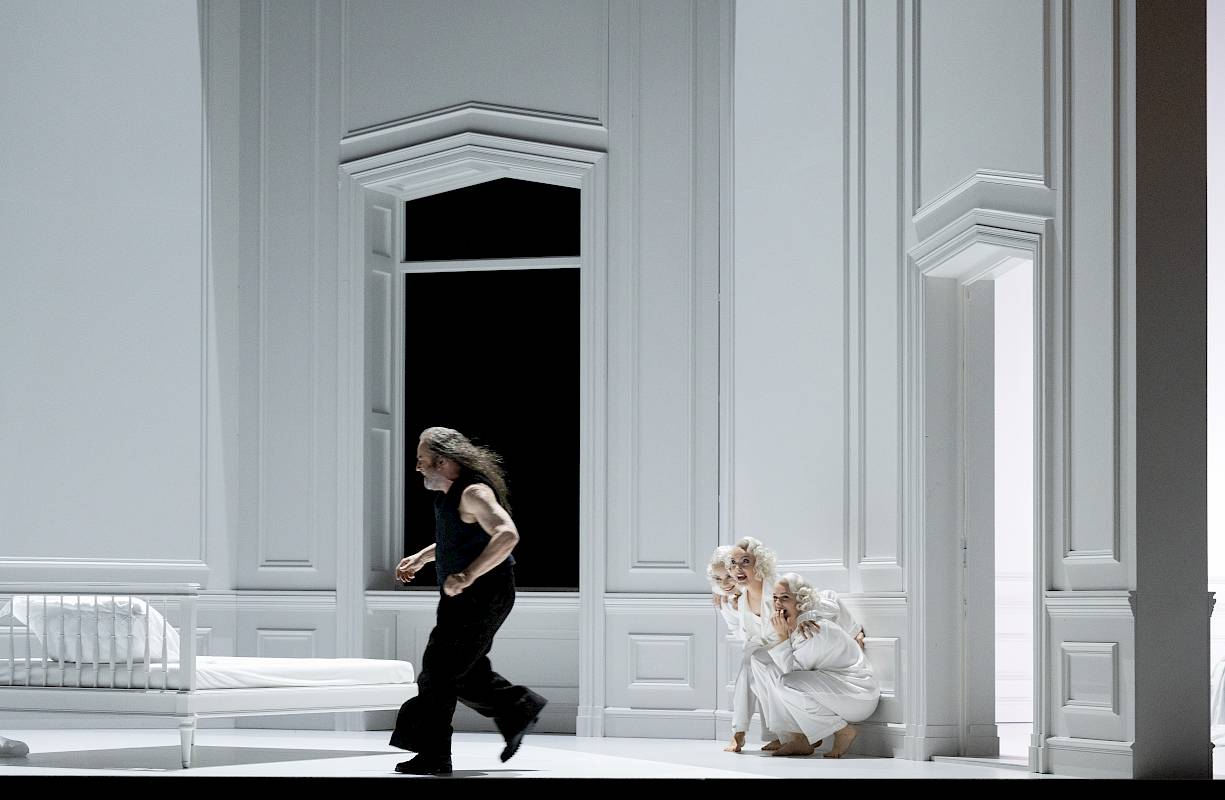 Because the bits with Alberich in never flag. With the gods, there’s a point in their first scene where it’s going on a bit, and it’s not Wagner’s fault, it’s the conductor’s or the director’s, just to keep that really moving.
Because the bits with Alberich in never flag. With the gods, there’s a point in their first scene where it’s going on a bit, and it’s not Wagner’s fault, it’s the conductor’s or the director’s, just to keep that really moving.
I suppose that if in gas terms you start off with the Rhinemaidens we’re at about six or seven, when the gods come on you turn it down, but it’s still bubbling away, then in scenes three and four when Alberich comes back and they go down to Nibelheim, you’re almost boiling. For me, that’s when everything just gets so exciting. Sometimes it’s tempting to get a little bit over-excited, and I think I probably do, but I’d rather that way than pulling back and saying, well, that’s actually not very good for my voice. My friends came from Oxford and said, Chris, you know, it’s very physical, and then my other friend in that lovely British way of undercutting said, well, you’re lying on your back most of the time in scene four – with my hands tied behind my back, having been pushed on to the ground. I said, it will be interesting to see if you can shout over an 80 piece orchestra lying on your back, and that’s what I’m doing. I remember Andreas saying to me, it’s not usually done like this, usually you’d be standing. And I said yes, but that’s precisely why you’ve got me to do this. It’s not, oh Chris is going to be a hero and he’s going to do everything the director wants, it’s just that there is always a way of finding a position, a way of expressing something, which means that you’re not just standing up. Sorry, this is a bit of a stream of consciousness, but I’ve always believe that the art of communication in song is about having a conversation that you would normally have when you’re speaking, but just using your singing voice.
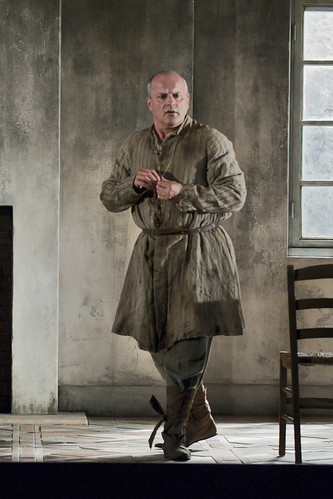 So there are parts where in a way you do take your singing voice away and start using your shouting voice, or a loud speaking voice, and I always think the most extraordinary thing is when you hear people shouting at one another in the street, or having a conversation and it gets a bit animated, you do start speaking [loudly, singingly], so why can’t you do that when you’re singing? OK, the notes will demand you sing this particular tune, but – I remember when we did Written on Skin, there’s a wonderful bit in it where the Protector has to say "smiles the Protector" (Purves in the role at the Royal Opera, pictued right by Stephen Cummiskey), self-referential, and I thought, what is he saying, what is the face, how would he say that just speaking, and I used exactly (shows the grimace and rasps), and it shredded my chords of course, because again projecting over a 50 piece orchestra is not easy, but what you’re doing, you’re communicating everything that you want to communicate rather than just a pretty sound.
So there are parts where in a way you do take your singing voice away and start using your shouting voice, or a loud speaking voice, and I always think the most extraordinary thing is when you hear people shouting at one another in the street, or having a conversation and it gets a bit animated, you do start speaking [loudly, singingly], so why can’t you do that when you’re singing? OK, the notes will demand you sing this particular tune, but – I remember when we did Written on Skin, there’s a wonderful bit in it where the Protector has to say "smiles the Protector" (Purves in the role at the Royal Opera, pictued right by Stephen Cummiskey), self-referential, and I thought, what is he saying, what is the face, how would he say that just speaking, and I used exactly (shows the grimace and rasps), and it shredded my chords of course, because again projecting over a 50 piece orchestra is not easy, but what you’re doing, you’re communicating everything that you want to communicate rather than just a pretty sound.
And I think what gets left out of the picture of Wagner and Rheingold is that it is speech-melody, not bald recitative.
Absolutely right,
One last question – funny was the word I saw used in one review, and I was so pleased, because Rheingold should be funny, shouldn’t it?
There’s not a whole deal of humour, but as situations arise, some aspects of the way we’re playing them, look, it is quite amusing,
Almost Offenbachian,
Yes, but a little bit more sincere. I really couldn’t be much happier.
That’s a relief.
Exactly, You don’t want to take on board all the unhappiness of Alberich and take his suffering too seriously and take it home with you. Just leave it on stage, leave it in the dressing room, and hope for the best.
Explore topics
Share this article
The future of Arts Journalism
You can stop theartsdesk.com closing!
We urgently need financing to survive. Our fundraising drive has thus far raised £49,000 but we need to reach £100,000 or we will be forced to close. Please contribute here: https://gofund.me/c3f6033d
And if you can forward this information to anyone who might assist, we’d be grateful.

Subscribe to theartsdesk.com
Thank you for continuing to read our work on theartsdesk.com. For unlimited access to every article in its entirety, including our archive of more than 15,000 pieces, we're asking for £5 per month or £40 per year. We feel it's a very good deal, and hope you do too.
To take a subscription now simply click here.
And if you're looking for that extra gift for a friend or family member, why not treat them to a theartsdesk.com gift subscription?
more Opera
 La bohème, Opera North review - still young at 32
Love and separation, ecstasy and heartbreak, in masterfully updated Puccini
La bohème, Opera North review - still young at 32
Love and separation, ecstasy and heartbreak, in masterfully updated Puccini
 Albert Herring, English National Opera review - a great comedy with depths fully realised
Britten’s delight was never made for the Coliseum, but it works on its first outing there
Albert Herring, English National Opera review - a great comedy with depths fully realised
Britten’s delight was never made for the Coliseum, but it works on its first outing there
 Carmen, English National Opera review - not quite dangerous
Hopes for Niamh O’Sullivan only partly fulfilled, though much good singing throughout
Carmen, English National Opera review - not quite dangerous
Hopes for Niamh O’Sullivan only partly fulfilled, though much good singing throughout
 Giustino, Linbury Theatre review - a stylish account of a slight opera
Gods, mortals and monsters do battle in Handel's charming drama
Giustino, Linbury Theatre review - a stylish account of a slight opera
Gods, mortals and monsters do battle in Handel's charming drama
 Susanna, Opera North review - hybrid staging of a Handel oratorio
Dance and signing complement outstanding singing in a story of virtue rewarded
Susanna, Opera North review - hybrid staging of a Handel oratorio
Dance and signing complement outstanding singing in a story of virtue rewarded
 Ariodante, Opéra Garnier, Paris review - a blast of Baroque beauty
A near-perfect night at the opera
Ariodante, Opéra Garnier, Paris review - a blast of Baroque beauty
A near-perfect night at the opera
 Cinderella/La Cenerentola, English National Opera review - the truth behind the tinsel
Appealing performances cut through hyperactive stagecraft
Cinderella/La Cenerentola, English National Opera review - the truth behind the tinsel
Appealing performances cut through hyperactive stagecraft
 Tosca, Royal Opera review - Ailyn Pérez steps in as the most vivid of divas
Jakub Hrůša’s multicoloured Puccini last night found a soprano to match
Tosca, Royal Opera review - Ailyn Pérez steps in as the most vivid of divas
Jakub Hrůša’s multicoloured Puccini last night found a soprano to match
 Tosca, Welsh National Opera review - a great company reduced to brilliance
The old warhorse made special by the basics
Tosca, Welsh National Opera review - a great company reduced to brilliance
The old warhorse made special by the basics
 BBC Proms: The Marriage of Figaro, Glyndebourne Festival review - merriment and menace
Strong Proms transfer for a robust and affecting show
BBC Proms: The Marriage of Figaro, Glyndebourne Festival review - merriment and menace
Strong Proms transfer for a robust and affecting show
 BBC Proms: Suor Angelica, LSO, Pappano review - earthly passion, heavenly grief
A Sister to remember blesses Puccini's convent tragedy
BBC Proms: Suor Angelica, LSO, Pappano review - earthly passion, heavenly grief
A Sister to remember blesses Puccini's convent tragedy
 Orpheus and Eurydice, Opera Queensland/SCO, Edinburgh International Festival 2025 review - dazzling, but distracting
Eye-popping acrobatics don’t always assist in Gluck’s quest for operatic truth
Orpheus and Eurydice, Opera Queensland/SCO, Edinburgh International Festival 2025 review - dazzling, but distracting
Eye-popping acrobatics don’t always assist in Gluck’s quest for operatic truth

Add comment